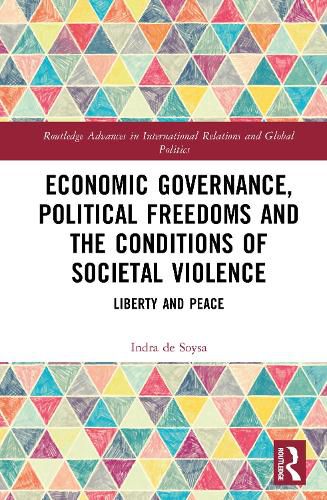Readings Newsletter
Become a Readings Member to make your shopping experience even easier.
Sign in or sign up for free!
You’re not far away from qualifying for FREE standard shipping within Australia
You’ve qualified for FREE standard shipping within Australia
The cart is loading…






This book shows how the underlying causes of civil war and political violence are based in concrete conditions relating to economic governance. The author argues that what matters for cauterizing the potentiality of "sustainable" violence is economic governance, specifically growth-promoting governance that maximizes returns to investment due to competitive free-market processes upheld by the rule of law and the protection of private property rights. The arguments are assessed against three major forms of societal violence-civil wars, one-sided violence by states against ordinary citizens, and interpersonal violence that results in mortality.
Political and economic rights and freedoms are clearly intertwined, but there may be advantages to prefacing one over another. This study shows why and how economic governance matters for generating civil peace, perhaps more so than rival perspectives based on the understanding that violence is motivated by political concerns and grievances that motivate people to rebel broadly. The book demonstrates that the organization of violence that is sustained over long periods of time is far more narrowly focused than the loud discourses generated by violence itself predict. Even if people have legitimate reasons for contesting a government's policies, such concerns become side-tracked, even abandoned, for reasons that may trump the necessity of compromise; namely, because more narrowly organized groups may have advantages for organizing violence and surviving sanction. The mechanism through which this may occur is the primary focus of this book. The author examines quantitative data but uses empirical detail from Sri Lanka as a case study. Relying on a variety of historical sources on the Sri Lankan conflict to guide the discussion, the author uses data collected by a host of individuals and agencies in the statistical analyses that follow.
The work demonstrates that economic governance matters more than the political mechanisms most often argued in the literature. It will be of interest to those studying South Asian Politics, economic development, sociology, history, law, international relations, cultural studies, and peace, security, and conflict studies.
$9.00 standard shipping within Australia
FREE standard shipping within Australia for orders over $100.00
Express & International shipping calculated at checkout
This book shows how the underlying causes of civil war and political violence are based in concrete conditions relating to economic governance. The author argues that what matters for cauterizing the potentiality of "sustainable" violence is economic governance, specifically growth-promoting governance that maximizes returns to investment due to competitive free-market processes upheld by the rule of law and the protection of private property rights. The arguments are assessed against three major forms of societal violence-civil wars, one-sided violence by states against ordinary citizens, and interpersonal violence that results in mortality.
Political and economic rights and freedoms are clearly intertwined, but there may be advantages to prefacing one over another. This study shows why and how economic governance matters for generating civil peace, perhaps more so than rival perspectives based on the understanding that violence is motivated by political concerns and grievances that motivate people to rebel broadly. The book demonstrates that the organization of violence that is sustained over long periods of time is far more narrowly focused than the loud discourses generated by violence itself predict. Even if people have legitimate reasons for contesting a government's policies, such concerns become side-tracked, even abandoned, for reasons that may trump the necessity of compromise; namely, because more narrowly organized groups may have advantages for organizing violence and surviving sanction. The mechanism through which this may occur is the primary focus of this book. The author examines quantitative data but uses empirical detail from Sri Lanka as a case study. Relying on a variety of historical sources on the Sri Lankan conflict to guide the discussion, the author uses data collected by a host of individuals and agencies in the statistical analyses that follow.
The work demonstrates that economic governance matters more than the political mechanisms most often argued in the literature. It will be of interest to those studying South Asian Politics, economic development, sociology, history, law, international relations, cultural studies, and peace, security, and conflict studies.